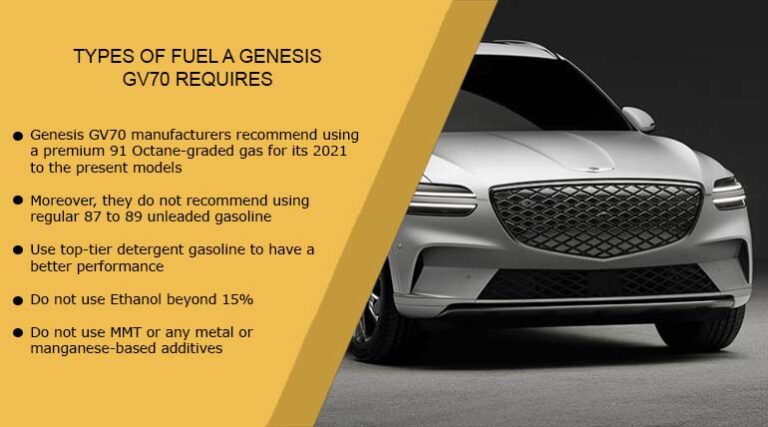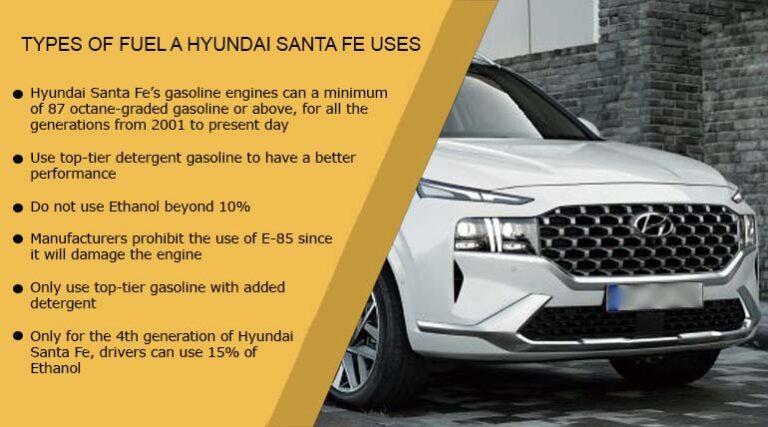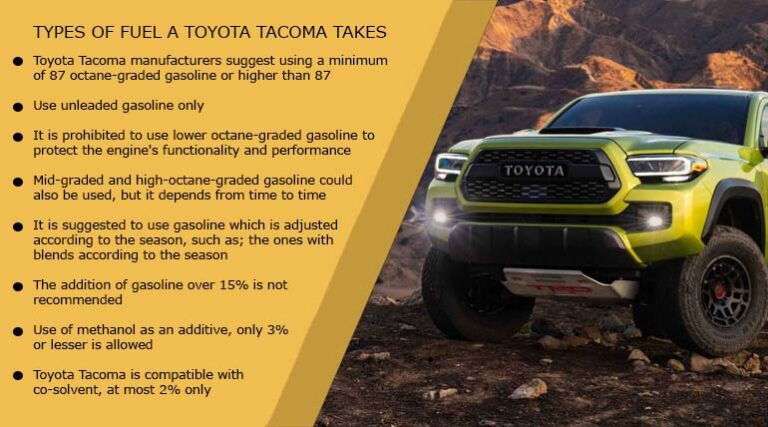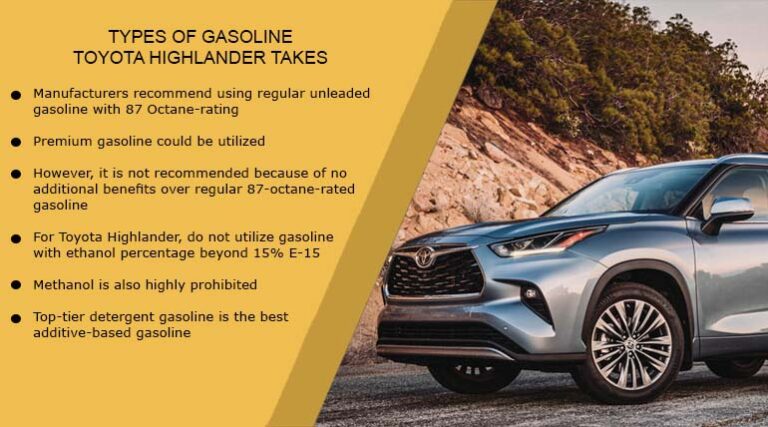GMC Yukon – Types of Fuel It Takes
This piece is going to cover all you want to know about the accurate types of fuel GMC Yukon takes. However, before we move into the details, let’s first get a brief introduction to the GMC Yukon.
Introduction to GMC Yukon
GMC Yukon, indeed is one of the most deluxe SUVs, is huge and offers comfort and refinement for its drivers and passengers. It debuted in 1991 by GMC, and its first model was launched in 1992, transforming the experience of off-road and highway driving technologically.
Let’s go through a brief outline of this article regarding the correct types of fuel for a GMC Yukon before jumping into the details;
To summarize, GMC Yukon uses a minimum of 87 octane-graded gasoline (Regular, unleaded) for all of its generations. Still, it is incompatible with 6.2 L V-8 and the first generation’s 8.1 L engines, which need a premium 93 octane-graded gasoline. Ethanol-85 (E-85) is only suggested for the manufactured engines to run on it (Flex-Fuel). The best additive to use is Top-Tier detergent gasoline. However, when it comes to towing, a heavy-duty task, Gasoline with 91 Octane grading or higher (93) is highly recommended for more efficient performance.
Types of Fuel All Generations of GMC Yukon Take
Below are the detailed answers to all of your queries regarding which types of fuel a GMC Yukon uses so that you can get maximum from your GMC Yukon while protecting the condition of its engine for better longevity and performance.
Related article: Types Of Gasoline A GMC Sierra Uses
Significance of Using the Correct Type of Fuel for Your GMC Yukon
However, now the query arises, why is it important to know about the right type of fuel for your GMC Yukon? The response to this is simple; to guard your engine against damage and keep your warranty from being void.
Fuel Type Based on GMC Yukon Engine’s Type
Based on your GMC Yukon engine, choose the correct types of fuel. Below are detailed, regarding the engines offered by the GMC Yukon’s total four generations and the compatible fuel/gasoline, according to its specific generation, models, and type of engine.
The GMC Yukon 1st Generation-1999 to 2006
Following are the four engines that are offered by the 1st generation of GMC Yukon;
- 4.8 L V-8
- 5.3 L V-8
- 6.0 L V-8
- 8.1 L V-8
To ensure that the engine runs smoother, cleaner, and with more power, it is suggested that the manual use of gasoline with a mid-graded 91 or premium 93 octane-graded is recommended. All this generation’s engines can function well on an unleaded 87 octane-graded or greater, regular gas. 8.1 L engines need a premium 93-octane-graded gasoline.
The GMC Yukon – 2nd Generation-2008 to 2014
Given below are the three engines offered by the 2nd generation of GMC Yukon;
- 5.3 L V-8
- 6.0 L V-8
- 6.2 L V-8
For all the engines offered by the 2nd generation GMC Yukon, Gasoline with 87 octane or mid-graded 91 or premium 93 octane-graded is recommended. For the engines mentioned above, except for the 6.0 L V-8, the 5.3 L V-8 and 6.2 L V-8 are Ethanol-85 (E85) compatible.
The GMC Yukon – 3rd Generation-2014 to 2020
Following are the two engines that are offered by the 3rd generation of GMC Yukon;
- 5.3 L V-8
- 6.2 L V-8
For all the engines offered by the 3rd generation, regular, unleaded gasoline with 87 Octane-rating is recommended for the 5.3 L V-8. For the engine 6.2 L V-8, a premium 93 octane rating is also good to go with. GMC Acadia also uses the similar gasoline types.
The GMC Yukon – 4th Generation-2020 to Present
Following are the three engines that are offered by the 4th generation of GMC Yukon;
- Duramax 3 L Turbo diesel Inline 6
- 5.3 L V-8
- 6.2 L V-8
For 5.3 L V-8, utilize a regular (unleaded) octane with a minimum of 87 or higher octane-graded gasoline. 6.2 L V-8 engines use 91 octane-graded or premium 93 octane-graded gasoline. For a Duramax 3 L Turbo diesel Inline 6, an ultra-low, Sulfur diesel, up-to 15 parts per million (ppm) is the required fuel.
Which Varieties of Fuel Should Be Used?
Today, we have a variety of fuel (gasoline and diesel) options for our automobiles. But does GMC recommend any of these for its GMC Yukon’s models and generations? We will attempt to address this question quickly in the next section. Stay Tuned!
GMC Yukon Suggested Fuel
Top-tier detergent gasoline is highly recommended by the GMC Yukon itself, which keeps the engines clean and away from debris. A minimum of 87 octane-graded gasoline (Regular, unleaded) is recommended but is not compatible with 6.2 L V-8 and the first generation’s 8.1 L engines, which needs a premium 93 octane-graded gasoline. Regarding towing, a heavy-duty task, Gasoline with 91 Octane grading or higher (93) is highly recommended for more efficient performance.
Reformulated Gasoline Fuel (RFG)
With a nature-friendly impact and for cleaner and greener burning, Reformulated Gasoline (RFG) is produced, which causes decreased smog and less toxic pollutants than regular gasoline, having no hostile impacts. It is said to increase the miles per gas number of your vehicle. It is also best recommended for the area having smog at a higher concentration to decrease air pollution. GMC Yukon can run well on Reformulated Gasoline Fuel (RFG).
E-85 or Gasoline/Oxygenated Blends
GMC Yukon can consume oxygenation blends, but their usage requires some regulations and rules. Among all the variants of GMC Yukon after 2011, gasoline with ethanol upto 15 percent (E-15) can be taken. For vehicles made earlier than 2011, gasoline with ethanol upto 10 percent (E-10) can be taken. A percentage of ethanol greater than 15%, i.e., Ethanol-85 (E-85), is only suggested for the engines that are manufactured to run on it (Flex-Fuel). Hence, If your GMC Yukon has a Flex-Fuel engine; it is E-85 compliant and safe to utilize E-85 fuel.
Gasoline having Methylcyclopentadienyl Manganese Tricarbonyl (MMT)
Gasoline having Methylcyclopentadienyl Manganese Tricarbonyl, abbreviated as MMT, was used to improve the octane of fuel with poor quality. It was also used to seize the knocking noise produced by engines back then. But as of today, it is advised by GMC Yukon’s manufacturers not to add this one to your tank since the presence of the metal Manganese in this additive can damage the system of your vehicle that controls the emissions.
Gas with Added Materials
TOP-TIER detergent gasoline is highly recommended to keep your engine clean, safe, and up to the emission standards. If this one is not offered in your area, you can utilize a bottle of GM Fuel-System-Treatment-Plus as its alternative added per oil change, which keeps your engine fit for longer periods. Additives prohibited from being used include methanol and any metal-based ones.
Biodiesels
Biodiesel oils are very nature friendly since they are derived from cooking oil (wasted), vegetable, and soybean oils, through a process called “Trans-esterification.” They can be sourced from canola and yellow grease and are biodegradable. This additive is said to lower emissions and increase the miles per gas of a vehicle. It is only compatible with diesel-based engines. GMC recommends using less than 20% of biodiesel (by volume) with diesel (the regular one). It is preferred to use 5% biodiesel if one wants to save up some bucks over one’s vehicle’s maintenance.
Frequently Asked Questions (FAQs’)
Can All The Generations of GMC Yukon Consume RFGs As Fuel?
You must be wondering if all four generations of GMC Yukon are eligible for using Reformulation Gasoline Fuel, so the answer to this is YES! It has been suggested to consume RFG for all GMC Yukon’s generations.
What If My Engine Knocks Afterwards Refilling?-A “Knocking-Noise” After Refueling! What Does It Indicate?
If one uses lower octane-rated gasoline in your GMC Yukon, it degrades the performance and economy of the engine. Gasoline will burn prematurely if put a lower octane gas in an engine with higher compression, causing an unsmooth burn and engine knock. Hence, it is extremely crucial to use the correct gasoline fuel with the correct octane grading.
I heard a fainted-knocking sound from the engine. It indicates no danger. If you hear a loud knocking sound, it is due to lower quality and lower octane-rate gasoline.
Fill the tank with premium or mid-rated octane gasoline to diminish the knocking-like noise.
How to Locate a Flex-Fuel Vehicle?
A yellow bezel surrounding the inlet of the fuel tank indicates that your vehicle is flex-fuel. If you cannot find it there, you can check out the door of your fuel tank as well.
If your GMC Yukon has a Flex-Fuel emblem and a yellow gas tank cap, it is E-85 compliant and safe to utilize E-85 Fuel.
But remember to burn all the flex-fuel when you run your vehicle on regular gas. And don’t add less than 3 gallons of flex-fuel in your tank while refilling.
GMC YUKON DRIVERS’ CHOICES! Regular Gasoline or Premium?
After conducting revisions from numerous forums, and reviews of the people using GMC Yukon around the globe, the conclusion is that; where the regular, unleaded gasoline with 87 Octane-rating has proved to work well for them, the ones using the premium gasoline with 91 or higher (93) Octane rating has proved to work much better for them.
Hence, regular and premium both can be used except for the engine 6.2 L V-8, which requires higher octane-graded gasoline, and the first generation’s 8.1 L engines, which need a premium 93 octane-graded gasoline.
According to some other drivers, the acceleration of their vehicle was comparatively decreased on an 87-octane-graded gas, although it was an affordable choice. But for improved performance, a 91 or premium 93 proved to work best for their GMC Yukon.
Conclusion
To conclude, GMC Yukon, one of the most deluxe SUVs, is huge and offers comfort and refinement for its drivers and passengers.
Hence, about types of fuel GMC Yukon takes, a minimum of 87 octane-graded gasoline (Regular, unleaded) for all of its generations. Still, it is incompatible with 6.2 L V-8 and the first generation’s 8.1 L engines, which need a premium 93 octane-graded gasoline. Use Ethanol-85 (E-85) for the engines manufactured to run on it (Flex-Fuel). The best additive to use is Top-Tier detergent gasoline. However, when towing, a heavy-duty task, use Gasoline with 91 Octane grading or higher (93) for more efficient performance.







